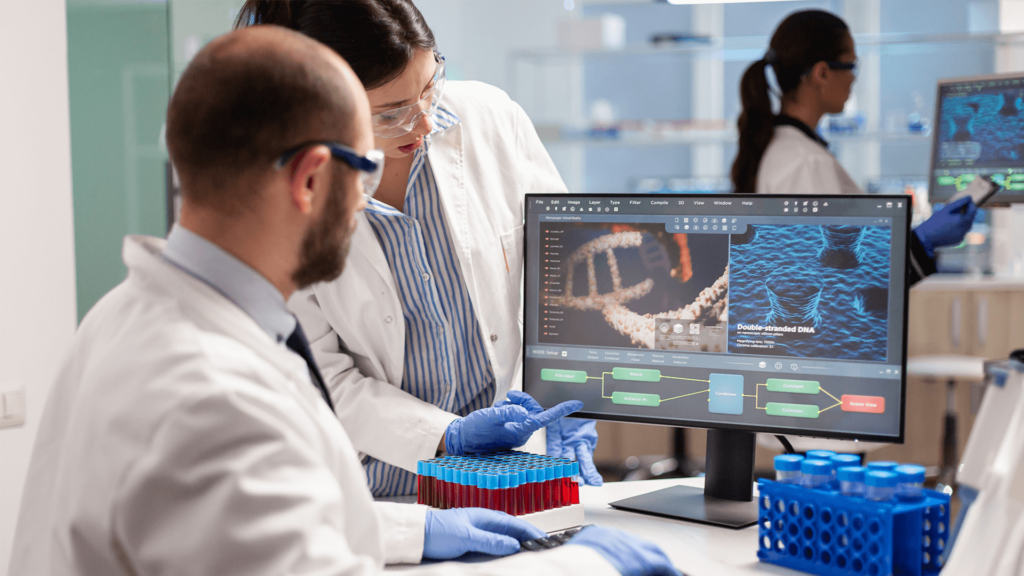How Data Protection Drives Success in Biotechnologies
Data is a part of every aspect of biotechnologies from the research lab to the production floor. A biotechnology company’s intricate processes, sensitive equipment, and complex data must always be secure to protect patient privacy and stay in compliance with strict regulations. If a company fails to protect their essential assets, they not only face ruining their reputation, but also steep fines and sanctions. Strong data security measures can benefit your biotechnology company by protecting sensitive information, maintaining public trust, and supporting continued advancements. Here’s how:
Protecting Intellectual Property
Every biotechnology company invests countless resources into research and development. All this hard work in biotechnologies involves very personal data regarding patients’ medical history. This helps researchers discover new tools and medicine that can transform the way patients receive care. Without proper data security measures though, this valuable intellectual property could be stolen or accessed by unauthorized personnel.
The first step to keeping your biotechnology company’s data safe is to monitor all your systems all the time. This means watching out for both physical and cybersecurity threats to ensure only those authorized can access your sensitive data. Biotechnologies require strong monitoring and management solutions to encrypt information, provide strict access controls, and backup data in case of emergencies. With these solutions, private data is hidden from unauthorized users and administrators are immediately notified of any suspicious activity so they can act quickly to keep their intellectual property safe.
Regulatory Compliance
Research in any biotechnology company is heavily regulated by HIPAA and GDPR due to the potential risks and ethical concerns associated with advancements in biotechnologies. Compliance with government regulations is non-negotiable and failing to adhere to these stipulations could result in hefty fines or even criminal prosecution. Data security ensures that sensitive patient data, research findings, and clinical trial results are protected in accordance with these legal requirements.
Maintaining Public Trust
According to the HIPAA Journal, over 30 million people had their personal health information exposed or stolen in 2024. Not only did this put patients at risk, but it also shook their trust in the establishments that were hacked. Public perception and trust are invaluable when it comes to research in biotechnologies. Clinical trials and medical research collect people’s most sensitive data, so it is vital that participants know their information is protected by the biotechnology company.
One way high-tech facilities are strengthening their security is by utilizing AI-powered systems. These systems can monitor and manage every aspect of your IT to optimize operations and prevent cyberattacks more effectively. AI can go so far as to analyze how your biotechnology company’s equipment is run and data is processed, looking for any signs of reduced efficiency or cyberthreats. Instead of responding to cyberattacks, these systems help prevent them and maintain the public’s trust in your facility.
Data-Driven Research and Development
Research into biotechnologies relies on massive datasets of research and development. Secure access to data is vital to performing almost every task in a biotechnology company. However, data breaches and system failures can slow down research, waste resources, and delay important discoveries. This is why biotechnology companies need high-performing equipment in their data centers to process vast amounts of data quickly and safely. Not only will this accelerate research, but it will also ensure that sensitive data remains protected throughout the discovery process.
Technologies that Protect Data in Biotechnologies
To effectively secure the personal data in your biotechnology company, several advanced tools and practices need to be implemented. Start by encrypting sensitive information so even if a cybercriminal breaks into your system, the data is unreadable without a decryption key. Similarly, limiting access to sensitive data helps you keep track of who has clearance to view this information and who doesn’t. Investing in server racks with built-in locks and other security devices will help keep your data safe from physical threats. Using multifactor authentication (MFA) ensures that only authorized personnel can access critical information online, keeping your biotechnology company’s data safe in every possible way.
Learn More About How to Protect Your Sensitive Information
When it comes to biotechnologies, data security is an absolute must. If your sensitive information isn’t protected, you risk financial, legal, and reputational consequences. JG Blackmon & Associates is here to make sure your biotechnology company is always running smoothly and protected thanks to our wide range of equipment meant to optimize all of your operations. Sign up for our monthly newsletter to always be up to date on the best ways to protect your high-tech facility and learn about the latest products that will help you do so.

